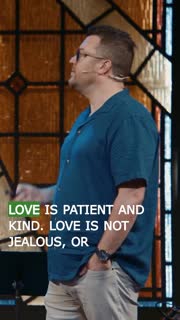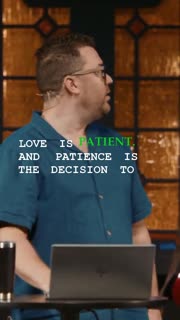Embracing Unity: Celebrating Diversity in Christ's Love
Devotional
Sermon Summary
Bible Study Guide
Sermon Clips
1) "Why do they leave? Religious hypocrisy, number one reason. 42% said because of religious hypocrisy. 35% said religion just doesn't make sense anymore, just fell apart once they started asking new questions. And then the next one, I found it interesting that the two of the top three are very similar. Religious bigotry. So, you aren't who you say you are, and I leave, because you're a hypocrite, or you're just a jerk to anybody who's different than you, and you hide behind religion. No thanks, that's not for me. I would rather have no religious affiliation than be like that, because even though I don't identify with that group of people, or that culture, or that whatever, I don't think you should discriminate against them, especially under the guise of being a God thing." [40:16] (51 seconds)
2) "We have a problem. We have a reputation problem. We have an interaction problem. We have a culture problem. We have a problem where we're so disunified, if that's the right word, divisive, that we're actually bigots towards people who think differently than us, or we're hypocrites, and we don't live out the Jesus we claim to follow. So today, I wanna talk about unity, and not uniformity, because it's important that you understand, there is a, there's a difference between unity and uniformity. There is a difference between unity and uniformity, and what I am hoping we can push towards and come away from today with, is the value of unity, not uniformity." [42:45] (47 seconds)
3) "Unity, on the other hand, is much different. It's a much higher reward, but it is higher risk, too. It takes a lot of work. It's what happens when you recognize, you actually identify and acknowledge the differences among us, but then instead of just acknowledging them, we actually learn from them and maybe even celebrate them. We realize that together we are better, and even though somebody looks differently than me in skin color or how they dress or how they vote or how they date or how they think or what their current theology is on something, that's actually something I can learn from, and there's value." [44:06] (36 seconds)
4) "If that's what we're trying to do, but it doesn't make sense if your goal is to advance the kingdom of Jesus, because God is on an eternal mission to reconcile all things to himself through the person and work of his son, Jesus Christ, so that one day there will be worshipers from every kindred and every tribe and every tongue and every nation gathered around the throne of King Jesus. And last week, or two weeks ago, sorry, when we were doing our service on worship, we read that passage, where we get that from, Revelation 4 and 5, and what do we see there? We see four beasts gathered around the throne and then 24 elders, and then when you zoom out, you see millions of angels, beasts, elders, angels. There is no uniformity here. But there's unity. Why? Because there's something bigger. There's something better. There's something holier than their differences." [45:06] (46 seconds)
5) "Love is patient and kind. Love is not jealous, or boastful, or proud, or rude. It does not demand its own way. It is not irritable, and it keeps no record of being wronged. It does not rejoice about injustice, but rejoices whenever the truth wins out. Love never gives up, never loses faith, is always hopeful, and endures through every circumstance. Love will last forever. When I was a child, I spoke and thought and reasoned as a child, but when I grew up, I put a lot of thought away childish things. Three things will last forever, faith, hope, and love, and the greatest of these is love. Let love be your highest goal." [49:38] (45 seconds)
6) "Love is patient. And patience is the decision to move at someone else's pace rather than pressure them to match yours. Patience is choosing to do less than you are capable of for the sake of keeping in step with someone else. Patience is the decision to pause rather than push. Now, impatiens is something totally different. Impatience is an emotion. You feel impatient. You feel impatient. Patience is something you have to choose to do. I don't know if you ever feel patient. You choose to be patient, you feel impatient. So love becomes a choice. Patience isn't natural, but love defers to the pace of the other. And patience is a a simple way of putting someone else above you. So love is patient." [58:03] (48 seconds)
7) "Love is also kind. Kindness, put simply, means to leverage one's strengths on behalf of another. When we are kind, we put our strengths, our abilities, our resources on loan to someone who lacks them in that moment. When you're kind, you put yourself at someone else's disposal. Kindness is love's response to weakness. Everybody knows how to be kind when kindness has a potential reward attached to it. The question I need to answer and the question you need to answer is, what is my natural response to weakness in people closest to me? Do I lean in or do I power up? Because to power up is a power play. It's not love. Do I hold it against them or do I lean in? Do I expect people to match my strengths even in their moment of weakness?" [59:45] (55 seconds)
8) "Love is not jealous or proud or boastful. And he groups all three of these together because simply put, all of these are expressions of insecurity. You're jealous. And depending on what version you're in, you're jealous. You're jealous of envy or jealousy. And really, like, envy and jealousy is a personal problem, not a relationship problem. But it's a personal problem. I have a jealousy problem, and it seeps into my relationships. And I bring it into the relationship because I have a personal problem. I don't feel good about me, so I can't let you feel good about you. I can't pull myself up right now, so I'm going to pull you down. That is what jealousy is. That is what envy is. And that's why it's toxic in the world. And that's why it's toxic in the world. And that's why it's toxic in the church." [01:01:02] (45 seconds)
9) "Love is not rude or dishonoring. We protect and safeguard what we value. Anything you ascribe value to, you protect. This is also an expression of honor. That's why later Paul says love always protects. Another facet of honor is that honor defers. It yields. Honor takes every opportunity to express you first to someone else. To which, I'm sure, if you're a thinking person and you're following along, the first thought that probably came through to your mind is, but isn't honor a good thing? It's a good thing. It's a good thing. It's a good thing. It's a good honor earned. Shouldn't I reserve honor for honorable people? And the answer to both of those is actually no. Honor is a decision. It's a choice. Honor is what love does." [01:02:33] (44 seconds)
10) "Love is not demanding of its own way. Love puts the interests and needs of others first. And so if your first thought is I didn't like the music or I didn't like how that person was dressed or somebody didn't say hi, love puts others first and doesn't demand that everything is our way. Something to keep in mind in church, because church is one of the hardest places for this because it's personal. It's religious. It has theology attached to it. But if you happen to feel uncomfortable in a service because of the language that's being spoken or the music that's being played, just recognize that for the first time, someone else might be feeling uncomfortable." [01:05:11] (38 seconds)
Ask a question about this sermon
2) "We have a problem. We have a reputation problem. We have an interaction problem. We have a culture problem. We have a problem where we're so disunified, if that's the right word, divisive, that we're actually bigots towards people who think differently than us, or we're hypocrites, and we don't live out the Jesus we claim to follow. So today, I wanna talk about unity, and not uniformity, because it's important that you understand, there is a, there's a difference between unity and uniformity. There is a difference between unity and uniformity, and what I am hoping we can push towards and come away from today with, is the value of unity, not uniformity." [42:45] (47 seconds)
3) "Unity, on the other hand, is much different. It's a much higher reward, but it is higher risk, too. It takes a lot of work. It's what happens when you recognize, you actually identify and acknowledge the differences among us, but then instead of just acknowledging them, we actually learn from them and maybe even celebrate them. We realize that together we are better, and even though somebody looks differently than me in skin color or how they dress or how they vote or how they date or how they think or what their current theology is on something, that's actually something I can learn from, and there's value." [44:06] (36 seconds)
4) "If that's what we're trying to do, but it doesn't make sense if your goal is to advance the kingdom of Jesus, because God is on an eternal mission to reconcile all things to himself through the person and work of his son, Jesus Christ, so that one day there will be worshipers from every kindred and every tribe and every tongue and every nation gathered around the throne of King Jesus. And last week, or two weeks ago, sorry, when we were doing our service on worship, we read that passage, where we get that from, Revelation 4 and 5, and what do we see there? We see four beasts gathered around the throne and then 24 elders, and then when you zoom out, you see millions of angels, beasts, elders, angels. There is no uniformity here. But there's unity. Why? Because there's something bigger. There's something better. There's something holier than their differences." [45:06] (46 seconds)
5) "Love is patient and kind. Love is not jealous, or boastful, or proud, or rude. It does not demand its own way. It is not irritable, and it keeps no record of being wronged. It does not rejoice about injustice, but rejoices whenever the truth wins out. Love never gives up, never loses faith, is always hopeful, and endures through every circumstance. Love will last forever. When I was a child, I spoke and thought and reasoned as a child, but when I grew up, I put a lot of thought away childish things. Three things will last forever, faith, hope, and love, and the greatest of these is love. Let love be your highest goal." [49:38] (45 seconds)
6) "Love is patient. And patience is the decision to move at someone else's pace rather than pressure them to match yours. Patience is choosing to do less than you are capable of for the sake of keeping in step with someone else. Patience is the decision to pause rather than push. Now, impatiens is something totally different. Impatience is an emotion. You feel impatient. You feel impatient. Patience is something you have to choose to do. I don't know if you ever feel patient. You choose to be patient, you feel impatient. So love becomes a choice. Patience isn't natural, but love defers to the pace of the other. And patience is a a simple way of putting someone else above you. So love is patient." [58:03] (48 seconds)
7) "Love is also kind. Kindness, put simply, means to leverage one's strengths on behalf of another. When we are kind, we put our strengths, our abilities, our resources on loan to someone who lacks them in that moment. When you're kind, you put yourself at someone else's disposal. Kindness is love's response to weakness. Everybody knows how to be kind when kindness has a potential reward attached to it. The question I need to answer and the question you need to answer is, what is my natural response to weakness in people closest to me? Do I lean in or do I power up? Because to power up is a power play. It's not love. Do I hold it against them or do I lean in? Do I expect people to match my strengths even in their moment of weakness?" [59:45] (55 seconds)
8) "Love is not jealous or proud or boastful. And he groups all three of these together because simply put, all of these are expressions of insecurity. You're jealous. And depending on what version you're in, you're jealous. You're jealous of envy or jealousy. And really, like, envy and jealousy is a personal problem, not a relationship problem. But it's a personal problem. I have a jealousy problem, and it seeps into my relationships. And I bring it into the relationship because I have a personal problem. I don't feel good about me, so I can't let you feel good about you. I can't pull myself up right now, so I'm going to pull you down. That is what jealousy is. That is what envy is. And that's why it's toxic in the world. And that's why it's toxic in the world. And that's why it's toxic in the church." [01:01:02] (45 seconds)
9) "Love is not rude or dishonoring. We protect and safeguard what we value. Anything you ascribe value to, you protect. This is also an expression of honor. That's why later Paul says love always protects. Another facet of honor is that honor defers. It yields. Honor takes every opportunity to express you first to someone else. To which, I'm sure, if you're a thinking person and you're following along, the first thought that probably came through to your mind is, but isn't honor a good thing? It's a good thing. It's a good thing. It's a good thing. It's a good honor earned. Shouldn't I reserve honor for honorable people? And the answer to both of those is actually no. Honor is a decision. It's a choice. Honor is what love does." [01:02:33] (44 seconds)
10) "Love is not demanding of its own way. Love puts the interests and needs of others first. And so if your first thought is I didn't like the music or I didn't like how that person was dressed or somebody didn't say hi, love puts others first and doesn't demand that everything is our way. Something to keep in mind in church, because church is one of the hardest places for this because it's personal. It's religious. It has theology attached to it. But if you happen to feel uncomfortable in a service because of the language that's being spoken or the music that's being played, just recognize that for the first time, someone else might be feeling uncomfortable." [01:05:11] (38 seconds)










